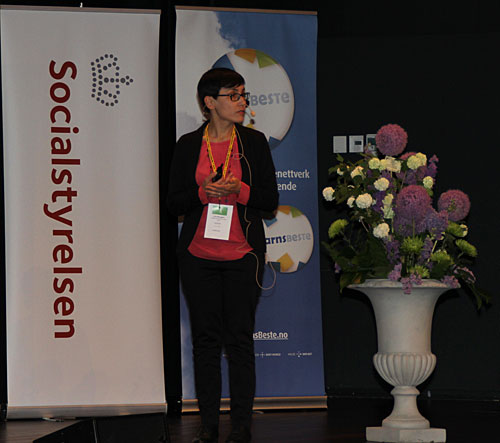Young carers in Italy – an overview
Licia Boccaletti – Anziani e non solo soc. Coop, Italien.

Licia Boccaletti
Only in recent years have the terms, "next of kin" and "family care," entered the political debate, In Italy. And there is still little awareness and attention among decision-makers and professional persons who come in contact with young carers.
In Italy there are 169 000 people between the ages of 15 and 24 years old who take care of an adult or elderly family member who has some form of disability. There are actually no current statistics on how many young carers there are in Italy, explained Boccaletti. Only in recent years have the terms, "next of kin" and "family care," entered the political debate, and there is still little awareness and attention among decision-makers and professional persons who come in contact with young carers. There are also no present policies that distinguish between young and older carers.
- There are no practices or any policies for young carers under eighteen years old, which is a major problem since they cannot get the support and assistance they need, says Licia Boccaletti.
Few studies
There are few studies in the area done in Italy, and they do not refer to young carers except as the siblings or children of the disabled family member. These conducted studies focus on the psychological effects, the impact on education and the relationships in the family.
- According to these studies, there was no evidence that the caring would have any psychological effects when taking care of a sibling with a disability. However, one could see that they were affected by the care given to a parent with an addiction problem. Several writers state that there might be a risk for negative consequences for young carers regarding education, says Licia Boccaletti.
Erasmus+ Care2Work.
In a 2014 interview study, 76 siblings of disabled persons tell some examples of what they are looking for: emotional support, information about the family member's illness and a professional person to talk to. There are also some public associations not conducting research that work together and try to spread awareness about the young carers' situation to teachers and school staff, and also create a self-awareness training programme for young carers in school for pupils aged 11 to 19 years old. One recently completed project is the Erasmus+ Care2Work. The project includes an education package for staff who meet young carers and a psycho-educational programme for young carers addressing conflict, stress and anger management. Both programmes are available as online education. Erasmus+ EPYC is an ongoing project for starting up an interest group for young carers with representatives from the municipality, social services and healthcare. The project also looks at support and service that can be given both individually and as a group in the form of different activities.
"A rather new subject"
Boccaletti also mentioned other initiatives such as Bluebox – an online resource for professionals and Alateen – support groups for children and youths with parents who have alcoholism.
- To summarise everything, one can say that young carers are still a rather new subject in Italy, but this topic is receiving more and more attention in the media and there is increasing involvement. We need to find out what the good practices are and what works best to support young carers. We must learn to find and recognise young carers and invest in practical support for them, says Licia Boccaletti.
Text and photo: Fredrik Jansson
Translation: Susan Raia Canali
Senast uppdaterad 2021-12-20 av EmelieS, ansvarig utgivare EmelieS
